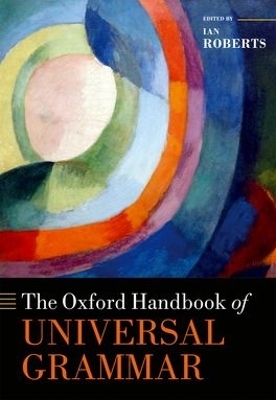
The Oxford Handbook of Universal Grammar
Seiten
2016
Oxford University Press (Verlag)
978-0-19-957377-6 (ISBN)
Oxford University Press (Verlag)
978-0-19-957377-6 (ISBN)
This handbook provides a critical guide to the most central proposition in modern linguistics: the notion, generally known as Universal Grammar, that a universal set of structural principles underlies the grammatical diversity of the world's languages. It will be a vital reference for linguists, philosophers, and cognitive scientists.
This handbook provides a critical guide to the most central proposition in modern linguistics: the notion, generally known as Universal Grammar, that a universal set of structural principles underlies the grammatical diversity of the world's languages. Part I considers the implications of Universal Grammar for philosophy of mind and the philosophy of language, and examines the history of the theory. Part II focuses on linguistic theory, looking at topics such as explanatory adequacy and how phonology and semantics fit into Universal Grammar. Parts III and IV look respectively at the insights derived from UG-inspired research on language acquisition, and at comparative syntax and language typology, while part V considers the evidence for Universal Grammar in phenomena such as creoles, language pathology, and sign language. The book will be a vital reference for linguists, philosophers, and cognitive scientists.
This handbook provides a critical guide to the most central proposition in modern linguistics: the notion, generally known as Universal Grammar, that a universal set of structural principles underlies the grammatical diversity of the world's languages. Part I considers the implications of Universal Grammar for philosophy of mind and the philosophy of language, and examines the history of the theory. Part II focuses on linguistic theory, looking at topics such as explanatory adequacy and how phonology and semantics fit into Universal Grammar. Parts III and IV look respectively at the insights derived from UG-inspired research on language acquisition, and at comparative syntax and language typology, while part V considers the evidence for Universal Grammar in phenomena such as creoles, language pathology, and sign language. The book will be a vital reference for linguists, philosophers, and cognitive scientists.
Ian Roberts is Professor of Linguistics at the University of Cambridge, having previously held posts in Geneva, Bangor, and Stuttgart. He was president of Generative Linguistics of the Old World (GLOW) in 1993-2001, and of the Societas Linguistica Europaea in 2012-13. He is currently Principle Investigator on the European Research Council Advanced Grant 'Rethinking Comparative Syntax'. He has published six monographs and two textbooks, including Diachronic Syntax (OUP, 2007), and has edited several collections of articles.
PART I: PHILOSOPHICAL BACKGROUND; PART II: LINGUISTIC THEORY; PART III: LANGUAGE ACQUISITION; PART IV: COMPARATIVE SYNTAX; PART V: WIDER ISSUES
| Erscheinungsdatum | 11.01.2017 |
|---|---|
| Reihe/Serie | Oxford Handbooks |
| Verlagsort | Oxford |
| Sprache | englisch |
| Maße | 171 x 246 mm |
| Gewicht | 1284 g |
| Themenwelt | Geisteswissenschaften ► Philosophie ► Sprachphilosophie |
| Geisteswissenschaften ► Psychologie ► Verhaltenstherapie | |
| Geisteswissenschaften ► Sprach- / Literaturwissenschaft ► Sprachwissenschaft | |
| ISBN-10 | 0-19-957377-8 / 0199573778 |
| ISBN-13 | 978-0-19-957377-6 / 9780199573776 |
| Zustand | Neuware |
| Haben Sie eine Frage zum Produkt? |
Mehr entdecken
aus dem Bereich
aus dem Bereich
Aspekte einer Ontologie des Logos
Buch | Hardcover (2024)
Springer Fachmedien (Verlag)
CHF 167,95
Wie die Menschheit zu ihrer größten Erfindung kam
Buch | Softcover (2022)
C.H.Beck (Verlag)
CHF 25,20
Macht und Legitimität politischer Sprache im Prozess der europäischen …
Buch | Softcover (2023)
Nomos (Verlag)
CHF 103,60


